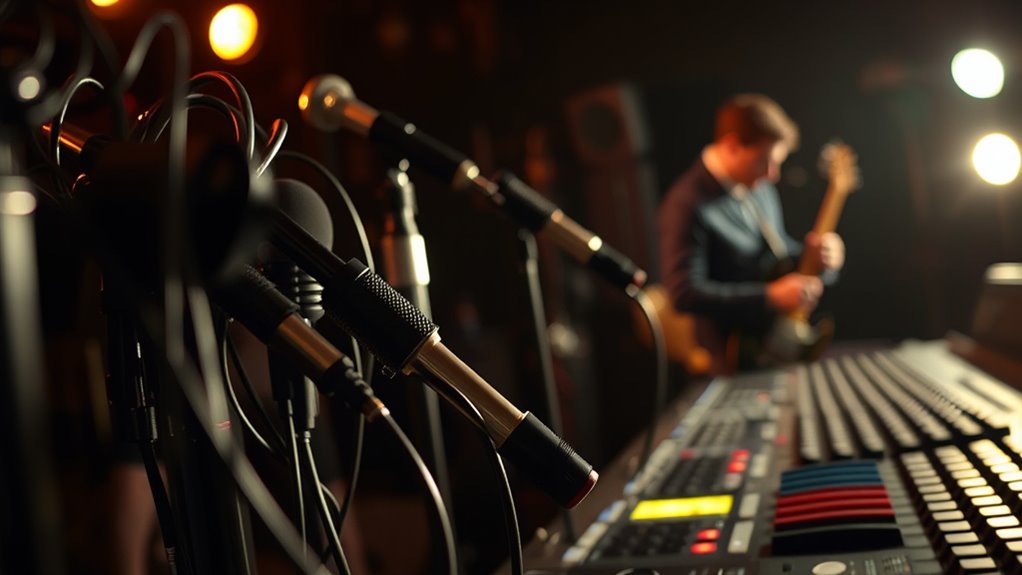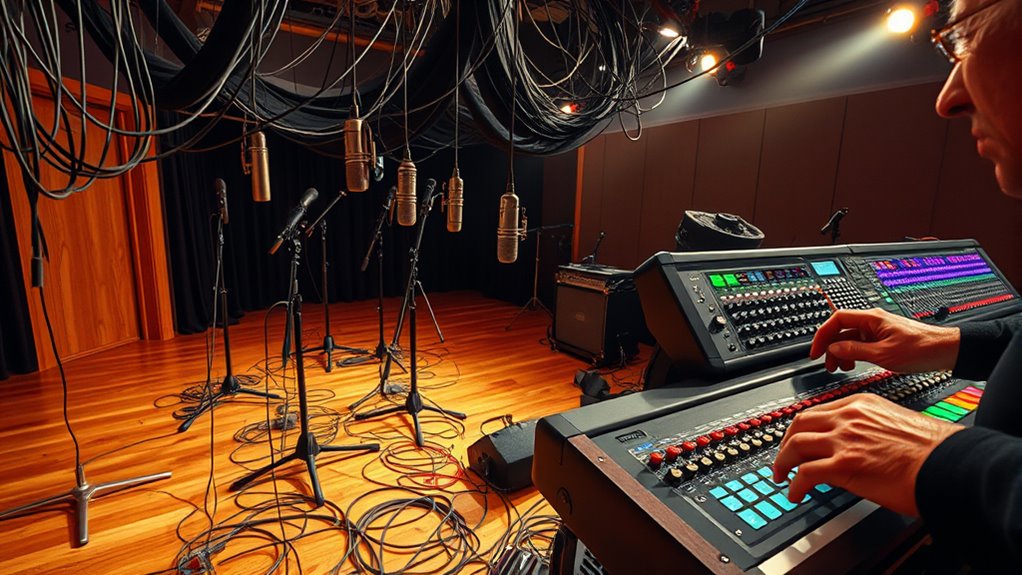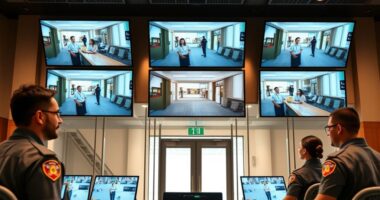During soundchecks, technicians work behind the scenes, carefully tuning everything to guarantee the best possible sound. They listen intensely, make minute adjustments, and use reference tracks for calibration. Communication is key, often through silent cues to keep the flow smooth. This hidden craftsmanship takes time and precision, focused on achieving clarity and balance. If you keep exploring, you’ll discover how these unseen efforts create the flawless performances you enjoy.
Key Takeaways
- Soundchecks are meticulous processes focused on tone, balance, and clarity, not just quick setups.
- Professionals listen intently, making subtle adjustments to prevent issues during live performances.
- Reference mixes and calibration ensure consistent equipment response and help identify problems early.
- Silent cues and behind-the-scenes teamwork coordinate adjustments without disrupting the flow.
- The craftsmanship involves unseen, precise efforts that enhance audio fidelity and make performances memorable.

Have you ever wondered what separates a good soundcheck from a great one? The difference often lies in the behind-the-scenes efforts and subtle techniques that most audience members never see. When you’re up on stage, it’s tempting to think that soundchecks are just quick setups, but in reality, they’re a carefully orchestrated process that requires precision, experience, and a keen ear. The best sound engineers and performers know that a successful soundcheck isn’t just about turning knobs and adjusting levels; it’s about creating a foundation for a flawless performance.
During a soundcheck, you might notice that professionals spend a lot of time listening, not just adjusting. They listen for the smallest discrepancies, tiny feedback squeals, or muddled frequencies that could ruin the sound during the show. To the untrained eye, it may look like they’re just fiddling with equipment, but they’re actually making vital decisions about tone, balance, and clarity. They often work in a specific order—checking drums first for high levels of bass and attack, then vocals, then instruments—ensuring each element has its space without overpowering others. This meticulous process helps prevent issues mid-performance, saving everyone from embarrassment and technical chaos.
A secret technique many seasoned sound engineers use involves creating a “reference mix” early on. They use familiar tracks or their own reference sounds to calibrate the system, making sure the equipment responds consistently. This helps them identify problems quickly and avoid surprises when the actual performance begins. They also rely heavily on visual and auditory cues, adjusting microphones and monitors based on what they see and hear. For instance, they might ask performers to sing or play a section repeatedly, fine-tuning the sound until it’s just right. This process isn’t rushed; it’s deliberate and methodical, often taking more time than you might expect. Additionally, understanding the importance of audio fidelity ensures that every nuance of the performance is captured and presented accurately.
Another aspect that’s rarely seen is the subtle communication between the sound engineer and the performers. They exchange cues and feedback silently, sometimes through hand signals or eye contact, to make quick adjustments without disrupting the flow. This coordination ensures that everyone is comfortable and that the sound isn’t just technically perfect but also emotionally engaging. Behind every great concert, there’s a stage crew working tirelessly behind the scenes—testing, tweaking, and listening—so that when the spotlight hits, all you notice is a seamless, enthralling performance. That’s the real secret of a soundcheck: the invisible, precise craftsmanship that makes the show unforgettable.
Frequently Asked Questions
How Do Sound Engineers Handle Unexpected Technical Failures During a Show?
When an unexpected technical failure occurs during a show, you quickly identify the problem and implement a backup plan. You keep calm, communicate clearly with the team, and use spare equipment or alternate signals if necessary. Your experience helps you troubleshoot swiftly, minimizing disruption. Staying flexible and prepared allows you to adapt on the fly, ensuring the performance continues smoothly despite unforeseen issues.
What Are the Most Common Mistakes Made During Soundchecks?
You often trip over your own feet by skipping proper preparation or rushing through the process. Common mistakes include neglecting to check all equipment beforehand, overlooking room acoustics, and not involving the performers early enough. These slip-ups can turn a smooth soundcheck into a nightmare. To avoid this, double-check all gear, communicate clearly with artists, and stay organized. A well-prepared soundcheck sets the tone for a successful show.
How Do Soundchecks Differ Between Small Venues and Large Festivals?
In small venues, your soundcheck is quick and intimate, focusing on balancing individual instruments and vocals. At large festivals, you need to coordinate with multiple teams, use more advanced equipment, and allocate extra time for stage setup and sound testing across different areas. You’ll also adapt for outdoor acoustics and ambient noise, making it essential to plan ahead and communicate clearly with your sound crew to ensure everything runs smoothly.
What Gear Do Sound Engineers Always Carry for Emergencies?
You always carry essentials like spare cables, batteries, and a multi-tool, because chaos can strike anytime. While your high-end mixer handles the main sound, those backup batteries keep the lights on when power fails unexpectedly. You pack a small toolkit for quick fixes, and a wireless mic for emergencies. Being prepared means you stay in control, turning potential disasters into smooth performances, no matter the venue size.
How Do Sound Engineers Coordinate With Performers During Soundcheck?
During soundcheck, you should communicate clearly and promptly with performers, using visual cues or hand signals to indicate levels or adjustments. You listen carefully to their feedback and make quick, precise changes to the sound mix. You also confirm their preferences beforehand, ensuring everyone’s comfortable. By staying attentive and adaptable, you create a seamless process, helping performers feel confident and ready for the show.
Conclusion
Now that you know the secrets behind soundchecks, you’ll see concerts in a whole new light. Imagine arriving early and catching a band fine-tuning their setup—like a real-life case where a small adjustment transformed the entire performance, impressing the crowd. Next time you attend a show, remember those behind-the-scenes efforts. It’s these hidden details that make live music truly exceptional. So, keep your ears open—you’re witnessing the magic in the making.










